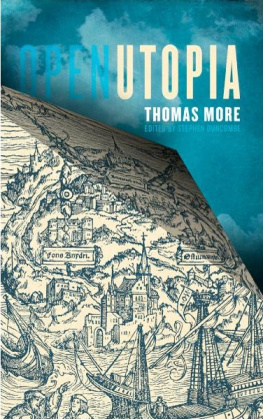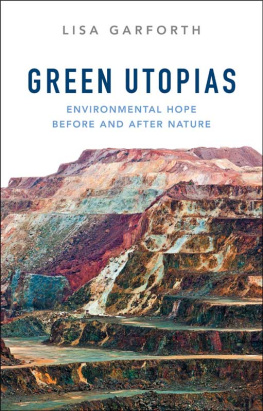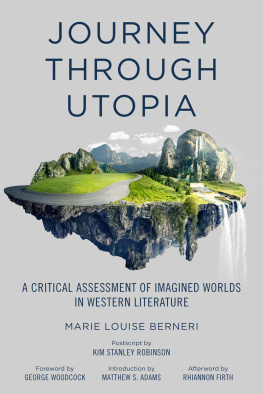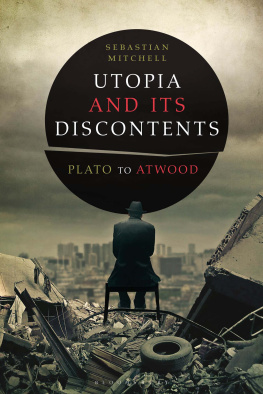OTHER ENGLANDS
Utopia, Capital, and Empire in an Age of Transition
SARAH HOGAN
STANFORD UNIVERSITY PRESS
STANFORD, CALIFORNIA
Stanford University Press
Stanford, California
2018 by the Board of Trustees of the Leland Stanford Junior University. All rights reserved.
No part of this book may be reproduced or transmitted in any form or by any means, electronic or mechanical, including photocopying and recording, or in any information storage or retrieval system without the prior written permission of Stanford University Press.
Printed in the United States of America on acid-free, archival-quality paper
Library of Congress Cataloging-in-Publication Data
Names: Hogan, Sarah (Professor of English), author.
Title: Other Englands : utopia, capital, and empire in an age of transition / Sarah Hogan.
Description: Stanford, California : Stanford University Press, 2018. | Includes bibliographical references and index.
Identifiers: LCCN 2017050813 | ISBN 9781503605169 (cloth : alk. paper) | ISBN 9781503606135 (e-book)
Subjects: LCSH: English fictionEarly modern, 1500-1700History and criticism. | UtopiasEnglandHistory16th century. | UtopiasEnglandHistory17th century. | Utopias in literature. | Capitalism in literature. | Imperialism in literature.
Classification: LCC PR830.U7 H64 2018 | DDC 823.009/372dc23
LC record available at https://lccn.loc.gov/2017050813
Cover design: Bruce Lundquist
Cover image: Detail from John Speed, The Theatre of the Empire of Great Britaine: Presenting an Exact Geography of the Kingdomes of England, Scotland, Ireland,... (161112).
To Matt, my fellow traveler
CONTENTS
ACKNOWLEDGMENTS
This book would not exist if not for two utopian scholars and educators of desire with whom I was fortunate to study. More than a decade ago, Crystal Bartolovich first planted the seeds of my interest in utopian literature and thought, in a memorably rigorous seminar at Syracuse University. Later, at the University at Buffalo (SUNY), I was also lucky to study the tradition with James Holstun, who proved to be an ideal mentor to cultivate this interest. Jim and Crystal remain for me critical utopians, and moreover, models of engaged, activist-oriented Marxist scholarship and pedagogy to which I can only hope to aspire.
Institutional support, from many sources, brought this project to fruition. I am grateful, principally, to all my colleagues in the English department at Wake Forest University who have encouraged and debated these ideas at many turns, and especially to Jessica Richard, Dean Franco, Olga Valbuena, Susan Harlan, Joanna Ruocco, Omaar Hena, Amy Catanzano, Judith Madera, Gale Sigal, Gillian Overing, and Ryan Shirey. In recent years, no one has supported this project and my career more than my senior colleague Herman Rapaport, who offered probing feedback on every page of this manuscript. I would like to thank, too, several institutional bodies at Wake Forest University, especially the Deans and Provosts Offices, the Humanities Institute, and the Reynolds Fund for generously supporting the research at the heart of this book, in the form of Archie, Faculty Development, Faculty Publication, and Summer Writing grants, and also through a Junior Research Leave. I also owe a world of gratitude to the diligent, patient staff at Stanford University Press, especially to Emily-Jane Cohen, who was willing to gamble on a first book, and also to Faith Wilson Stein and Elspeth MacHattie.
Utopias are usually arrived at through the vehicle of discourse, and often in the company of friends. This study is no exception. Many of these chapters have benefited from stimulating, spirited conversations at the annual meetings of the Society for Utopian Studies, and from participation in the Folger Shakespeare Librarys 2016 seminar on Mores Utopia. I know this project to be improved by the suggestions, questions, and original ideas offered by fellow scholars in search of utopia, especially Christopher Kendrick, Phillip Wegner, Antonis Balasopoulos, Cathy Curtis, Zo Hristova-Sutherland, Jude Welburn, and the late, loved Nicole LaRose. Former professors Randy Schiff, Andrew Stott, and Scott Stevens, and my former colleagues and dear friends in the English Department at Drake University, were also knowledgeable sources of support early in this research pursuit.
Several friendsbut especially Amy OShaughnessy, Benjamin Gardner, Guy Witzel, J. J. Butts, Amy Licht, Erik Waterkotte, Aimee Mepham, and Leah Benedicthave talked me through the more challenging moments of this labor, while their good company daily reminds me of the better nature of humankind. In countless drives around the side streets of Winston-Salem, Joanna Ruocco has proven to be the best interlocutor for exploring and imagining other worlds. My large, loud, affectionate familiesHogans, Garites, Gunthers, Cocuzzis, Piers, and Wolfeshave also provided encouragement and kindness in more ways than I can possibly acknowledge here. In particular, the treasured friendship of my three sisters, Amy, Betsy, and Catherine, and their weekly pep talks, saw this project through from its infancy to its completion. And to my wise, loving parents, Jack and Mary Hogan, thank you for always believing in the minds of your daughters and supporting their aspirations.
This book is dedicated to Matt Garite, a bibliophile, psychonaut, flower-punk, ecotopian, and editor extraordinaire, whose companionship, Im convinced, remains the very best state of being.
INTRODUCTION: ORIGIN STORIES
In 1609, Robert Gray, an Anglican preacher and a propagandist for the Virginia Company, writing from the comfort of his home in London, would recruit overseas adventurers by promising them all happie and prosperous successe, which may either augment your glorie, or increase your wealth, or purchase your eternitie. Though recent ages in England had felt no urgent need for expansion, or so Gray asserts, multitude, or what we would now call overpopulation, occasions his biblically framed injunction to emigrate. Behind his vision of the New World as New Canaan is then a vision of an implied present gone wrong, or at the very least, a less than utopian England.
Indeed, Good Speed to Virginia, like so many sermons advocating for early seventeenth-century settlement, overoptimistically imagines the early English colony as a solution or remedie to Englands demographic and social crises, particularly unemployment and dispossession. Gray describes the English body politics illness and ailments as follows:
There are echoes of Thomas Mores near-sociological correlation of unemployment with crime here, yet in Grays tract, the countrys not-too-distant pastlike Nova Britanniamight also be said to be an alterae terrae, or a more Golden Age, since this plagued nation once yelded vnto all that were in it a surplussage of all necessities when the Commons of our Country lay free and open for the poore Commons to inioy,... [and] there was roome enough in the land for euery man, so that no man neded to encroch or inclose from another. Contrasted with a contemporary England that has birthed more children than it can rear, an imaginary, romanticized, and irrevocably lost past offers a second fiction to counterbalance Virginias redemptive plantation. Gray gestures both backward to a feudal commons and outward to a land of limitless property (because not yet claimed) in order to envision a more peaceful, plentiful future commonwealth that will immortalize its settlers, purge England of its excesses and crimes, and all the while, increase the nations collective wealth.
I do not start with this tract because it offers a novel colonial or nationalist fiction, but because it might be said to exemplify the rhetorical rule. In the propaganda of early empire, idealized fictions of an English past and future belie an England made strange to itselfhistorically as well as geographically. Caught in the purgatorial limbo of its self-generated mythical histories and its fictions of millennial-colonial destiny, sixteenth- and seventeenth-century England is represented in a state of transitional indeterminacy. Gray is not alone in this regard; as Andrew Escobedobuilding on Walter Benjamins, Benedict Andersons, Michel Foucaults, and Michel de Certeaus theories of homogeneous timehas explained, Renaissance writers often find the national present eerily empty, temporally isolated from both past and future, and consequently, they evoke the impression of historical difference, temporal provisionality, and even anachronism.
Next page






